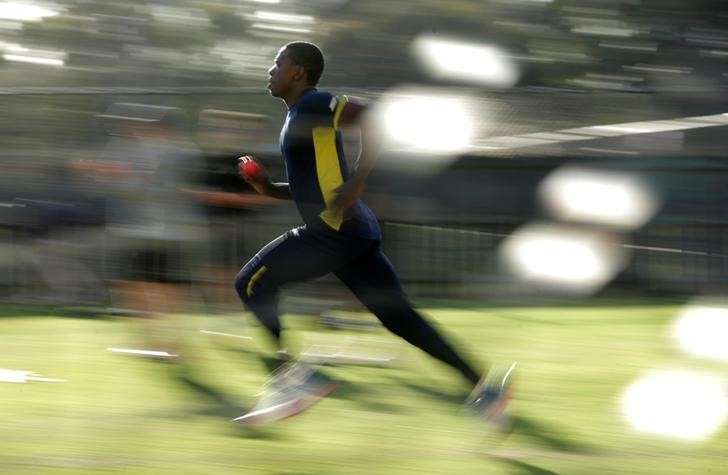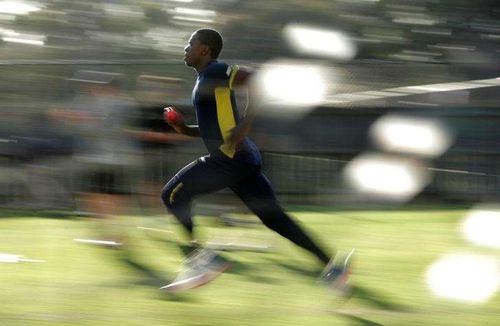
Proteas wrecking ball Rabada wants to stay the course

By Amlan Chakraborty
NEW DELHI (Reuters) - Kagiso Rabada's shoulders are big enough to carry the burden of being a pace spearhead but he is also looking to strike a balance between bowling flat out and staying the course, the South African speedster told Reuters.
Fast bowlers are cricket's most vulnerable players and South Africans are already fretting over the workload of a 21-year-old who is tipped to lead the Proteas attack for years to come, at least once Dale Steyn heads off into the sunset.
While his pace-bowling Delhi team mate Pat Cummins has spent much of the five years since his sensational test debut wrapped up in cotton wool by a fearful Cricket Australia, Rabada has been playing pretty consistently since his international bow.
Still, Rabada, who first represented his country in 2014 and turns 22 later this month, reckons his young body has coped reasonably well with the considerable rigours of playing cricket in all three formats.
"I think the older I get, the hard it will get, definitely," he said in an interview.
"But I'm not there yet. So right now it feels nice, I feel like I can do that."
With the ball in his hand, Rabada is always looking for wickets but a parallel search is also on to find ways to ensure he does not burn out.
"Have I found the balance?" he shrugs. "I don't know. That's an ongoing process ... There are also some precautions you take to avoid certain mishaps.
"I think I've been training nicely, doing what I need to do. I'm continuously finding that balance - how much to bowl, how much to rest and how much to train."
Rabada announced his arrival as an emerging talent on the world stage in 2015 by claiming a record six for 16, including a hat-trick, in his one-day debut against Bangladesh.
His 71 wickets from 17 tests further attest to his potential as a future leader of the Proteas attack but at the moment the strapping right-armer has a more rudimentary approach to his role in the national team.
"My role in the South Africa team is to try and get wickets, to field well and to try and score some runs down the order," he added.
"I don't see myself as a leader, no one's told me that."
Rabada played six matches for Delhi Daredevils in the ongoing 2017 Indian Premier League before returning home and he said the Twenty20 tournament was "a huge network of ideas."
He cited interactions with Cummins and team "chief mentor" Rahul Dravid, the India test batting great, to illustrate his point.
"Myself and Pat, we are basically the same age and bowl the same thing with very similar actions. We talk about different things about bowling, networking once again," he said.
"Speaking to someone like Rahul Dravid, his batting experience and what he found hard... what he finds hard, a lot of batsmen would find hard too," Rabada added.
"So you get insight, as a bowler, from a bowler and a batter."
Rabada feels the IPL has had a profound impact on Indian cricket, bringing financial stability to the game and broadening the local talent pool.
Twenty20 cricket's constant innovations have caught the fancy of the young fans in South Africa and the country has launched the T20 Global Destination League scheduled for later this year.
Rabada, one of its marquee players, hopes it will have an impact in South Africa comparable to that the IPL has had in India.
"Whole lot of people are in IPL because of the money. Not only the money though but money is a massive thing. Hopefully it will be a similar thing in South Africa," he said.
"Young players would have ambitions of playing in the league. Hopefully it kicks off and becomes a good one."
(Reporting by Amlan Chakraborty in New Delhi; editing by Nick Mulvenney and Sudipto Ganguly)